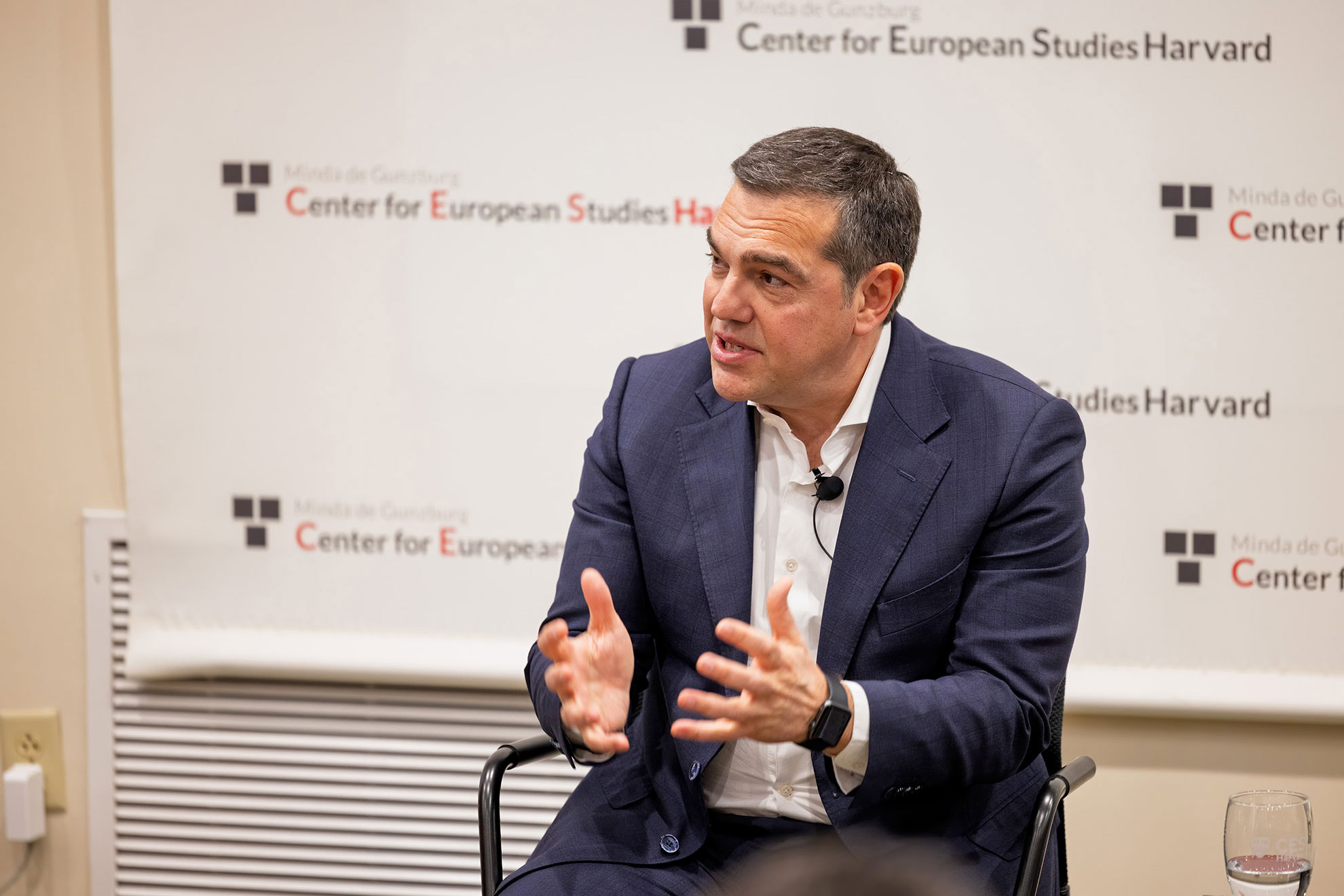Stressing the need for European reform and unity in the face of multiple challenges, Aléxis Tsípras, the former prime minister of Greece, addressed a standing-room-only crowd at the Minda de Gunzburg Center for European Studies on March 25, which marked Independence Day in Greece.
Tsípras presented proposals for Europe to counter looming financial and trans-Atlantic turbulence, strengthen its cohesion, and elevate its geopolitical and economic position. The presentation was moderated by Peter A. Hall, Harvard’s Krupp Foundation Professor of European Studies and a resident faculty member at CES, where Tsípras is a Policy Fellow this spring.
“We are seeing historical changes in the world that affect not only the geopolitical balance of power and the post-war liberal international order, but democracy itself,” said Tsípras, who currently serves as a member of the Hellenic Parliament for the SYRIZA-Progressive Alliance party.
He noted that the post-Cold War international order led not to fairly distributed growth but to the deregulation of financial markets, culminating in the global and European financial crises. He also said that the West had “underestimated the warnings that Russia would respond militarily if NATO insisted on adopting an open-door policy on Ukraine and Georgia in 2008.” U.S. engagement in the region has not allowed for the pivot to the Indo-Pacific to take place, leaving more space for China, “not only in the South China Sea but globally.”
These developments have heralded “a shift from a unipolar to a multipolar world in which the United States remains the most powerful force but has lost its dominance,” Tsípras said. To counter, the U.S. is “disengaging itself from any obligation toward Europe and promoting a logic of might makes right.”
“We are seeing historical changes in the world that affect not only the geopolitical balance of power and the post-war liberal international order, but democracy itself.”
Alexis Tsipras
Tsípras called for Europe to enhance its strategic autonomy while retaining trans-Atlantic dialogue regardless of NATO’s future. “I believe strongly that Europe can and should use its common foreign and security policy to play a role not only of deterrence, but also as a force for peace and stability particularly in regions where NATO should not or cannot be present,” he said.
Tsípras then named several strategic goals. These include an EU — not NATO — strategy for Ukraine that brings “peace with the best possible terms for Kyiv,” enforced by an international peacekeeping force, as well as a future that gives Ukraine the choice to “move toward the EU.” He also called for an end to Israel’s bombing in Gaza, as well as the resumption of talks for a two-state solution. He stressed the need for a clear message to Turkey, and said that the “unacceptable” recent arrest of opposition leader and mayor of Istanbul, Ekrem İmamoğlu, must have consequences. “We cannot convince anyone, particularly in the Global South, of our principles if we prove to have double standards,” he said.
For Europe’s economy, Tsípras outlined four policy proposals. First, he referred to Germany’s €900 billion fiscal package as a permanent break from Wolfgang Schäuble’s ordoliberal mindset, reflecting how much faster Europe would have exited the economic crisis if this mindset had been abandoned 15 years ago. He proposed “raising the debt threshold for all member states to around 100 percent.”
His second proposal called for Germany’s new fiscal approach to be leveraged “in a way that benefits Europe as a whole, rather than being used to subsidize domestic firms of bigger countries.”
His third proposal was for “the EU to supplement its common monetary policy with a federal fiscal instrument. A treasury department, just like the United States, as any other successful monetary union does.”
This federal treasury department could be empowered “to issue common European debt to finance the strategic autonomy of the EU on energy and defense, to facilitate the green transition, to promote research and innovation, to restore Europe’s crumbling network infrastructure, and, more importantly, to increase our cohesion funds and to reduce inequalities through investments in the welfare state and education.”
“The EU needs a deepening of its internal market, on the basis of the Draghi and Letta Reports,” he concluded.
Tsípras moved on to the challenges facing EU cohesion. In recent years, he said, political parties have facilitated the rise of nationalist and extreme far right parties. “Conservative parties have adopted the rhetoric and policies of the extreme right to keep their votes. Center-left parties are seen as elitist and disconnected from the middle and working class. And left parties have been absorbed by doctrine and petty politics.” He said the lack of a comprehensive European migration policy has also contributed to the rise of the extreme right.
Returning to the issue of debt, Tsípras reiterated that fiscal solidarity and rebuilding are more important than an imaginary bottom line. “If it is necessary to finance not only the rearming of Europe, but also innovation, growth, and cohesion, then this is something that we’ll have to do,” he said.
“Europe must be a force both for deterrence and for peace,” Tsípras concluded. “The best option is to stand on our feet. That means to strengthen our internal markets, to strengthen our cohesion and convergence, and, of course, to decide for strategic autonomy, which means a common external policy and policy of defense.”
Source link

